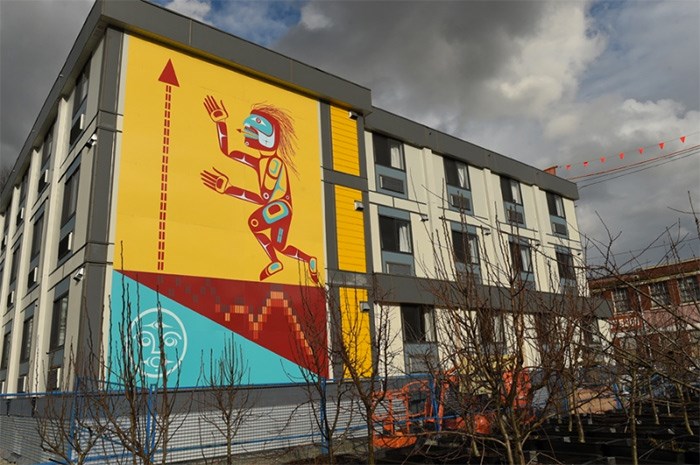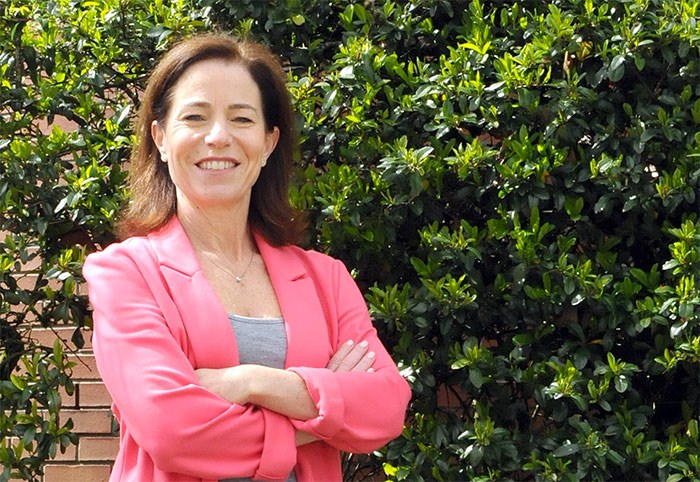 ¬È∂π¥´√Ω”≥ª≠is home to a 40-unit modular housing building at Main and Terminal, where tenants are a mix of previously homeless and low-income people, some of whom with mental health and addictions challenges. Photo Dan Toulgoet
¬È∂π¥´√Ω”≥ª≠is home to a 40-unit modular housing building at Main and Terminal, where tenants are a mix of previously homeless and low-income people, some of whom with mental health and addictions challenges. Photo Dan Toulgoet
Housing Minister Selina Robinson says ¬È∂π¥´√Ω”≥ª≠is ‚Äúat the front of the list‚Äù to receive some of the $291 million her government will dedicate to the construction of 2,000 modular housing units in B.C. over the next two years, but she wouldn‚Äôt say how many units the city can expect.
The city made a pitch in the summer to get 600 modular units built and open in ¬È∂π¥´√Ω”≥ª≠before winter arrives. The self-contained suites, which can be built quickly and moved from site to site, would be for homeless people and those who live in shelters.
‚Äú[Vancouver] is at the front of the list,‚Äù said Robinson in a telephone interview Tuesday with the Courier. ‚ÄúThey‚Äôre pretty clear about their commitments. But there are certainly other communities around the region and around the province that, frankly, have said we want to have some of those. That‚Äôs the part that I find particularly interesting ‚Äî that homelessness is not just a ¬È∂π¥´√Ω”≥ª≠issue. We‚Äôre seeing it in the suburbs, we‚Äôre seeing it in small communities, all around the province.‚Äù
 Housing Minister Selina Robinson said she has spoken to Mayor Gregor Robertson about the city’s need for modular housing funding.
Housing Minister Selina Robinson said she has spoken to Mayor Gregor Robertson about the city’s need for modular housing funding.
Robinson said she has spoken to Mayor Gregor Robertson about the city’s need and visited the city’s only modular housing building at Main and Terminal, which opened earlier this year. The 40-unit building was built and designed in six months and cost $3 million, none of which came from the former provincial government.
‚ÄúI don‚Äôt want people to think that ¬È∂π¥´√Ω”≥ª≠is just going to get everything,‚Äù Robinson said. ‚ÄúWe have a province that we‚Äôre looking at, and a homelessness issue that has been festering for a decade under the previous government. We‚Äôve taken our first steps to address an urgent issue. There‚Äôs more for us to do. I don‚Äôt want anyone to think that we‚Äôre done.‚Äù
The urgency to get 600 units open in ¬È∂π¥´√Ω”≥ª≠is propelled by the increasing numbers of homeless people living on the street. A total of 537 people were recorded as ‚Äústreet homeless‚Äù after a count in March. An additional 1,601 people were counted as living in some form of shelter.
Shelter space and accommodation at single-room-occupancy hotels is also scarce.
The cost to build 600 units in ¬È∂π¥´√Ω”≥ª≠was estimated in the summer at $45 million. That dollar figure was based on $75,000 per unit. It‚Äôs unclear whether the price has increased. In Vancouver‚Äôs case, the municipality would use city land and work with private landowners to secure property for the 600 units, with the maximum number of units per site at 40.
The B.C. government’s announcement Sept. 11 to spend $291 million on modular housing also included an additional $170 million over three years to fund staff and support services such as health care for tenants of the 2,000 units.
While waiting for the government’s decision on number of units to be funded in Vancouver, city staff has been busy working to expedite the time it would take to get such housing approved, built and open before winter arrives.
On Wednesday, council unanimously supported a staff recommendation that now gives the city’s director or planning the discretion to choose the sites for the modular housing. The move means none of the modular housing proposals would have to be rezoned and, therefore, not require a public hearing.
As Gil Kelley, the city’s director of planning, explained after the meeting, he has the discretion to approve a location for a modular housing building, albeit with neighbours and businesses in the chosen area notified by the city. Kelley said he can also send proposals to the development permit board, which allows public input.
“Anything that’s controversial, I would forward to that board,” said Kelley, noting approval of the temporary housing units would be for a maximum of five years. “They do have open meetings with public comment, and there would be notification.”
Kelley said the modular housing would not be built in single-family districts and, most likely, not in industrial zones. Commercial and multi-family zones are the areas of the city that his staff is looking at, he said, noting private landowners will also be approached to use their land.
‚ÄúPrivate sites would likely be those beginning their redevelopment planning and process, which could take several years,‚Äù he said. ‚ÄúIt‚Äôs really, ‚ÄòDo they have a civic interest in helping out with the affordable housing crisis, particularly for the city‚Äôs most vulnerable?‚Äô Early conversations between other city agencies [such as the ¬È∂π¥´√Ω”≥ª≠Affordable Housing Agency] and some of the private parties is that there‚Äôs a willingness to do that.‚Äù
Asked about the city’s original goal to have the 600 units opened before winter, Kelley said he was hopeful but noted there is also a bid process to choose a manufacturer, or manufacturers, for the housing. That can’t occur until the city learns whether it’s getting the funding for the units.
“I think it’s probably more likely that it could come mid-to-late winter, or even early spring,” he said. “But it’s still useful because we’ve got people who need shelter year-round and who are either homeless or working poor, or just need a place to live. So whenever they come on line, they’ll be useful. It would be great if they would be ready by winter, or sometime this winter.”
Next week, municipal politicians will mix with their provincial counterparts, including Robinson whose portfolio includes municipal affairs, at the Union of B.C. Municipalities’ conference in Vancouver. When the Courier suggested to the minister that it would be an opportune time to announce which municipalities will receive funding for modular housing, she said, “I’ll take that under advisement.”
Read more from the


